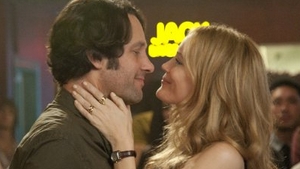 Judd Apatow’s This Is 40 puts a hysterical spin on the fact that everyone gets old. In fact, the comedy is so refreshing that it must have taken a lesson or two from his 2009 film Funny People; if you’re gonna make a movie with somewhat depressing subject matter, put some humor in it (especially if the word funny is in the title!). Just because you’re dealing with some very heavy emotions and situations doesn’t mean the audience doesn’t need to laugh. You may know this by now but Apatow doesn’t make rom-com fluff. Instead he gets to the heart of the matter and focuses on relatively down-to-earth people (foul-mouthed though they may be) with relatively believable problems (vulgar and absurd though they may be).
Judd Apatow’s This Is 40 puts a hysterical spin on the fact that everyone gets old. In fact, the comedy is so refreshing that it must have taken a lesson or two from his 2009 film Funny People; if you’re gonna make a movie with somewhat depressing subject matter, put some humor in it (especially if the word funny is in the title!). Just because you’re dealing with some very heavy emotions and situations doesn’t mean the audience doesn’t need to laugh. You may know this by now but Apatow doesn’t make rom-com fluff. Instead he gets to the heart of the matter and focuses on relatively down-to-earth people (foul-mouthed though they may be) with relatively believable problems (vulgar and absurd though they may be).
For the most part what Apatow does with his films is give audiences a look into the lifestyles of people (most likely the thing 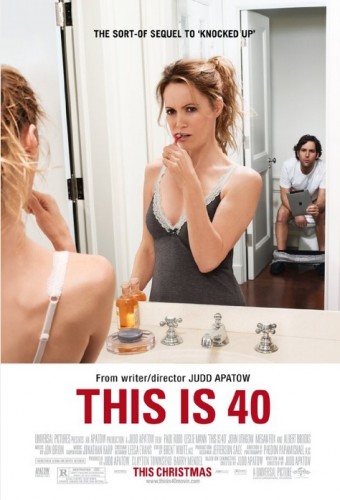 he himself is going through with real life wife Leslie Mann and daughters Maude and Iris Apatow) in an attempt to assure us that “it’s OK to be messed up and unhappy“. This Is 40 deals with a lot of issues, probably the most in any of his films. Issues like old age, both resentment and acceptance of it, family strife, finance, business, etc. It’s like a buffet of case studies or college courses just waiting to be picked over by hopeful/would-be psychiatrists and undergrad students. Moreover these characters make no qualms about letting us know that they are just a tad insane.
he himself is going through with real life wife Leslie Mann and daughters Maude and Iris Apatow) in an attempt to assure us that “it’s OK to be messed up and unhappy“. This Is 40 deals with a lot of issues, probably the most in any of his films. Issues like old age, both resentment and acceptance of it, family strife, finance, business, etc. It’s like a buffet of case studies or college courses just waiting to be picked over by hopeful/would-be psychiatrists and undergrad students. Moreover these characters make no qualms about letting us know that they are just a tad insane.
As you might expect from seeing The 40-Year Old Virgin, the sort-of prequel Knocked Up or even 10 minutes of Funny People, Apatow has no problem with raunchy material. In fact, ad-libbed over-the-top vulgar comedy is kind of his thing. Also, like many times before, he throws his wife Leslie Mann into the mix and she, as usual, flies wildly off the handle (and this time her daughter Maude looks to follow in her footsteps). In fact she’s so good at screaming, yelling and having on-camera breakdowns, she’s pretty much the American answer to Kiera Knightly. Aside from Len Wiseman you’d be hard pressed to think of another director who casts his wife so often, and further apparently doesn’t have problems with her being nude in cinemas world-wide (perhaps it’s for bragging rights?)
But good old Judd sure likes to take his time getting the point across doesn’t he? His films are kind of a workout. Still, you certainly have to hand it to him for being smart enough to understand that tough material can’t be crammed into 90 minutes and similarly can’t be resolved in the same amount of time. As usual he gives us enough exposure to these characters so we truly get to know them, their personalities, problems, motivations and the like. That said This Is 40 is still just a bit longer than most audiences will want to be exposed to the misery of these well-lighted “normal” characters on screen. In short, while well intentioned, we don’t need something to be 134 minutes long to tell us that people don’t like getting old.
The family (also known as the Apatow brood, sans Judd) are far from being normal. Let’s rephrase that, they are normal in the sense that they don’t come across fabricated. Society has come a long way since Leave It To Beaver, and while people were equally messed up back then, at least entertainers made it look like people had some semblance of manners, morals and organization. These days, books, TV shows and films alike relish in how crazy being normal is and This Is 40 is no exception. Secret expenses, farting in bed, lack of sex drive, hemorrhoids, it’s all put on display (well not that last one) but the film wins points for honesty and isn’t afraid to say what most likely, in some form, goes on in households behind closed doors.
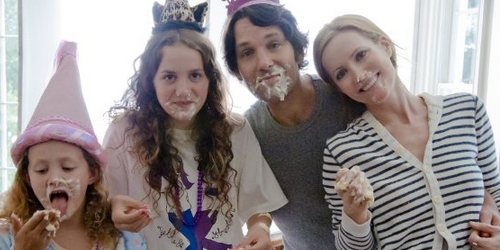
The film, Apatow’s most targeted to date, has a handful of key scenes that strike relateable emotional cords. For instance when Mann tells Rudd “We’re like business associates…There’s no more passion.” you start to feel for them. Even a statement like, “Sometimes I think you want to kill me” and the immediate response “I do want to kill you” seems morbid but the cuteness in which it comes across just can’t help but endear you to these characters a bit more in light of what they’re going through. There’s actually lots of heart and soul in the film but it’s sometimes tough to find amid the drawn out scenes, forced altercations and absurd humor. Again, these sequences may be fictitious but it’s not that hard to relate to the characters, even more so if you’re near either the parents or kids’ ages.
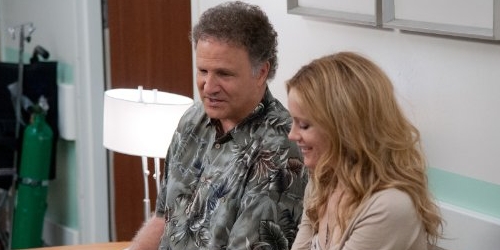
Rudd and Mann are likable even when the stress of things eat at them. While that old saying that “opposites attract” should come into play, their differences in tastes, styles, interests etc. are actually driving them apart. While the parents are fighting and not shy about yelling about how they’re feeling, the children too have begun to grow apart. The oldest daughter now has no time and wants nothing to do with the youngest. In an attempt to get the family together, Rudd and Mann do what any parents might suggest – limit and even eliminate the kids’ use of electronics. Only then do they realize that with no distractions they have know next to nothing about their kids which makes them feel even older. As do their laughably outdated suggestions of “building forts and playing with sticks”. Sounds depressing but rest assured this isn’t Funny People 2.0 and Apatow throws in the likes of Melissa McCarthy, Chris O’Dowd, Albert Brooks and more for welcomed comic relief.
G-S-T RULING:
So, like life, nothing is resolved at the end of this Apatow joint and in a way it’s fitting. No way would we buy troubled characters who realize they have a lot of work ahead of them and then be fooled into thinking all their worries just disappear as a Ryan Adams song sends them into the credits. This isn’t a story touting it’s OK to be you. It does one better by telling us don’t be afraid to be afraid. No one is perfect and nobody has it all figured out. The key, like any relationship, is about communication, management and acceptance; three things the leads don’t realize until the end.
Sure it’s an overblown commercial for learning to talk to your kids and significant other, but with a whole lot of vulgar and at times side-splitting humor thrown in it feels less so. Dr. Spock by way of say, Cheech and Chong? Maybe that’s what this world needs to get through to anyone; a profoundly different approach. However, like going to a mall, Apatow’s film hits you with such a barrage of people, places, situations that very little of it sticks and you walk to the parking lot nor recalling much of the 2+ hours you spent save for some high points.
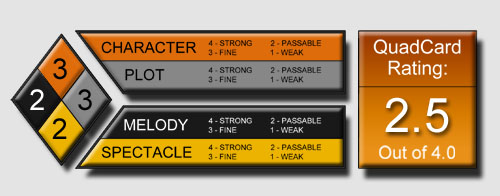
G-S-Talking Point: Like a pinata, you never know what you’re going to get in an Apatow picture. Will there be a slew of cameos? An absurd level of brilliant humor? Various nipple slips? Irreverent references? Sometimes it’s all and sometimes it’s none but the elephant in the room in this film is actually a TV show. Someone must not be happy about DVD sales of LOST (or the show ending) because like shameless in-movie commercials, there are so many “plugs” that, while funny to those who know the show well, are about as subtle as a brick. So tell us, what do you consider the most blatant product placement in a film??

